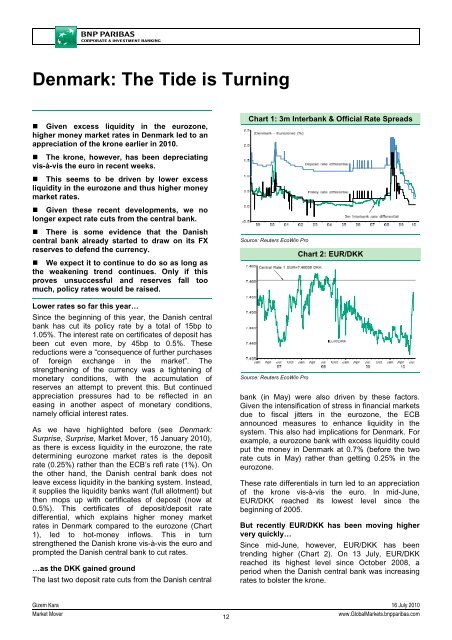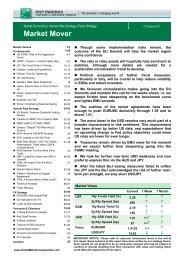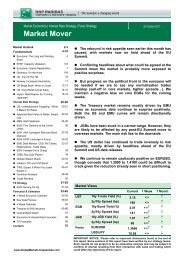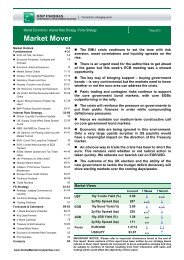Market Economics | Interest Rate Strategy - BNP PARIBAS ...
Market Economics | Interest Rate Strategy - BNP PARIBAS ...
Market Economics | Interest Rate Strategy - BNP PARIBAS ...
Create successful ePaper yourself
Turn your PDF publications into a flip-book with our unique Google optimized e-Paper software.
Denmark: The Tide is Turning<br />
• Given excess liquidity in the eurozone,<br />
higher money market rates in Denmark led to an<br />
appreciation of the krone earlier in 2010.<br />
Chart 1: 3m Interbank & Official <strong>Rate</strong> Spreads<br />
• The krone, however, has been depreciating<br />
vis-à-vis the euro in recent weeks.<br />
• This seems to be driven by lower excess<br />
liquidity in the eurozone and thus higher money<br />
market rates.<br />
• Given these recent developments, we no<br />
longer expect rate cuts from the central bank.<br />
• There is some evidence that the Danish<br />
central bank already started to draw on its FX<br />
reserves to defend the currency.<br />
• We expect it to continue to do so as long as<br />
the weakening trend continues. Only if this<br />
proves unsuccessful and reserves fall too<br />
much, policy rates would be raised.<br />
Lower rates so far this year…<br />
Since the beginning of this year, the Danish central<br />
bank has cut its policy rate by a total of 15bp to<br />
1.05%. The interest rate on certificates of deposit has<br />
been cut even more, by 45bp to 0.5%. These<br />
reductions were a “consequence of further purchases<br />
of foreign exchange in the market”. The<br />
strengthening of the currency was a tightening of<br />
monetary conditions, with the accumulation of<br />
reserves an attempt to prevent this. But continued<br />
appreciation pressures had to be reflected in an<br />
easing in another aspect of monetary conditions,<br />
namely official interest rates.<br />
As we have highlighted before (see Denmark:<br />
Surprise, Surprise, <strong>Market</strong> Mover, 15 January 2010),<br />
as there is excess liquidity in the eurozone, the rate<br />
determining eurozone market rates is the deposit<br />
rate (0.25%) rather than the ECB’s refi rate (1%). On<br />
the other hand, the Danish central bank does not<br />
leave excess liquidity in the banking system. Instead,<br />
it supplies the liquidity banks want (full allotment) but<br />
then mops up with certificates of deposit (now at<br />
0.5%). This certificates of deposit/deposit rate<br />
differential, which explains higher money market<br />
rates in Denmark compared to the eurozone (Chart<br />
1), led to hot-money inflows. This in turn<br />
strengthened the Danish krone vis-à-vis the euro and<br />
prompted the Danish central bank to cut rates.<br />
…as the DKK gained ground<br />
The last two deposit rate cuts from the Danish central<br />
Source: Reuters EcoWin Pro<br />
Source: Reuters EcoWin Pro<br />
Chart 2: EUR/DKK<br />
bank (in May) were also driven by these factors.<br />
Given the intensification of stress in financial markets<br />
due to fiscal jitters in the eurozone, the ECB<br />
announced measures to enhance liquidity in the<br />
system. This also had implications for Denmark. For<br />
example, a eurozone bank with excess liquidity could<br />
put the money in Denmark at 0.7% (before the two<br />
rate cuts in May) rather than getting 0.25% in the<br />
eurozone.<br />
These rate differentials in turn led to an appreciation<br />
of the krone vis-à-vis the euro. In mid-June,<br />
EUR/DKK reached its lowest level since the<br />
beginning of 2005.<br />
But recently EUR/DKK has been moving higher<br />
very quickly…<br />
Since mid-June, however, EUR/DKK has been<br />
trending higher (Chart 2). On 13 July, EUR/DKK<br />
reached its highest level since October 2008, a<br />
period when the Danish central bank was increasing<br />
rates to bolster the krone.<br />
Gizem Kara 16 July 2010<br />
<strong>Market</strong> Mover<br />
12<br />
www.Global<strong>Market</strong>s.bnpparibas.com
















